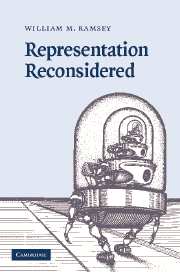Book contents
- Frontmatter
- Contents
- List of figures
- Preface
- 1 Demands on a representational theory
- 2 Representation in classical computational theories: the Standard Interpretation and its problems
- 3 Two notions of representation in the classical computational framework
- 4 The receptor notion and its problems
- 5 Tacit representation and its problems
- 6 Where is the representational paradigm headed?
- References
- Index
4 - The receptor notion and its problems
Published online by Cambridge University Press: 12 November 2009
- Frontmatter
- Contents
- List of figures
- Preface
- 1 Demands on a representational theory
- 2 Representation in classical computational theories: the Standard Interpretation and its problems
- 3 Two notions of representation in the classical computational framework
- 4 The receptor notion and its problems
- 5 Tacit representation and its problems
- 6 Where is the representational paradigm headed?
- References
- Index
Summary
In the last chapter we explored two notions of representation associated with the CCTC paradigm and saw how these notions do important explanatory work within this theoretical framework. As we saw, it is possible for CCTC to address the job description challenge and show how notions of representation actually belong in a physicalist (or computationalist) story of how the brain works. By contrast, I'll argue that the notions of representation we are going to explore in the next two chapters do not actually meet the job description challenge and do not enhance our understanding of the cognitive systems that allegedly use them. Indeed, I'll suggest that the propensity to regard states as representations for the reasons associated with these notion has led to some deep misconceptions about the nature of many of the newer, non-CCTC theories of cognitive operations. In this chapter, we'll examine one of these notions – or more accurately, a family of notions – that has become a popular way of thinking about mental representation in such fields as cognitive neuroscience, connectionist cognitive modeling, and cognitive ethology. The family of representational notions I'll explore is one I will simply call the “receptor notion.” In the neurosciences, the same sort of state is often referred to as a “detector.” After explaining what I take this notion to involve, my aim will be to argue that it is not a useful theoretical posit of cognitive science.
- Type
- Chapter
- Information
- Representation Reconsidered , pp. 118 - 150Publisher: Cambridge University PressPrint publication year: 2007



